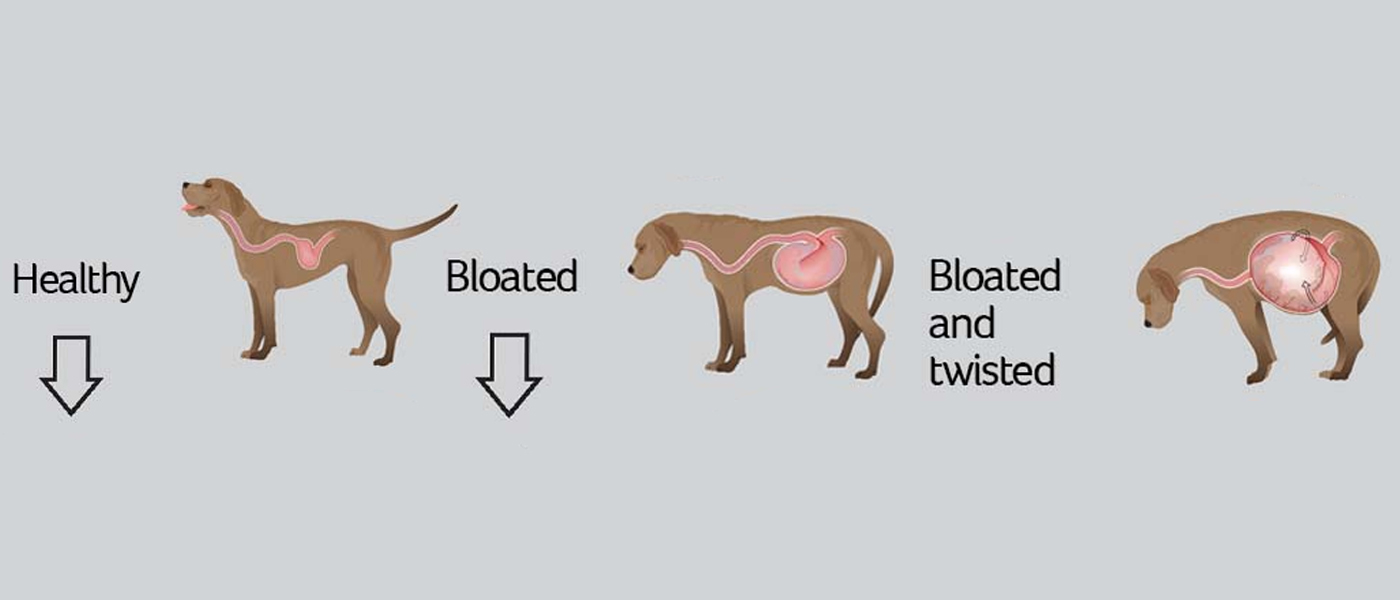Bloat in dogs, medically known as Gastric Dilatation and Volvulus (GDV), is a life-threatening condition involving the bloating and twisting of the stomach. It most commonly affects large, deep-chested breeds such as Great Danes, St Bernards, Weimaraners, Setters, German Shepherds, and Boxers.
In GDV, the stomach fills with gas, food, or fluid and then twists on itself. This twist traps the contents and cuts off blood flow to the stomach and other vital organs, leading to tissue death, shock, and potentially death within hours if not treated promptly.
Risk Factors for GDV
Several factors increase the risk of GDV:
- Breed and body type: Large, deep-chested dogs are most susceptible.
- Eating habits: Rapid ingestion of a large, dry, high-fat meal, especially followed by exercise.
- Raised food bowls: These may cause dogs to swallow more air.
- Stress and competition: Fearful temperament or eating near other dogs can increase risk.
- Age and gender: Older male dogs are more commonly affected.
- Genetics: GDV is considered hereditary. Dogs with a first-degree relative who had GDV should not be bred.
Recognising GDV: Symptoms to be aware of
Early recognition is critical. Symptoms include:
- Sudden enlargement of the abdomen
- Distressed, anxious, panting, and restless behavior
- Extremely painful, tight abdomen with a hunched back
- Frequent, unproductive attempts to vomit
- Rapid heart rate and weak pulse
- Pale or bluish gums, indicating poor circulation and shock
If you notice these signs, seek emergency veterinary care immediately.
Diagnosis and treatment
Veterinarians diagnose GDV using:
- Physical examination
- X-rays to confirm stomach twisting
Treatment involves:
- Emergency surgery to untwist the stomach and restore blood flow
- Gastropexy, a procedure that secures the stomach to the abdominal wall to prevent recurrence
- Removal of damaged tissue, including the spleen if necessary
- Intensive post-operative care, including fluid therapy and monitoring for complications.
The sooner treatment begins, the higher the chance of survival.
Preventing GDV
While the exact cause of GDV is not fully understood, you can reduce your dog’s risk with these strategies:
- Feed two smaller meals daily instead of one large meal.
- Use slow-feeding bowls to prevent gulping and air swallowing.
- Keep food bowls on the ground.
- Avoid exercise for at least an hour after meals.
- Separate dogs during feeding to reduce stress and competition.
- Create a calm environment to minimise anxiety.
- Consider preventative gastropexy for high-risk breeds, either as a standalone procedure or during desexing.
- Avoid breeding dogs with a history of GDV.
GDV is a medical emergency that requires swift action. Knowing the signs, understanding the risks, and implementing preventive measures can make all the difference. If you suspect your dog may have bloat, do not wait—contact your veterinarian immediately.
